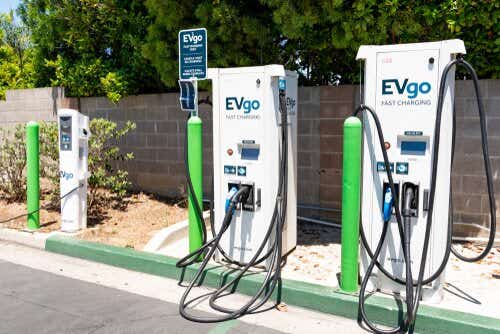Can you own an EV without a home charger setup?
Anyone can own an EV regardless of whether they have a home charger - for instance, it’s possible you live in a property that isn’t suitable for a home charger, but that shouldn’t preclude anyone from moving away from a petrol or diesel model.
However, owning an EV without a home charger does undoubtedly come with (not insurmountable) challenges. While you won’t have to pay for the installation of a home charger on top of the purchase of the EV, the benefits of a home charger are that they’re solely for your use and usually the most affordable way of charging as long as they’re combined with an EV or time-of-use tariff.
Charging an EV without a home charger
Workplace charging
If you’re trying to work out how to charge a car battery without a charger at home, the easiest place to charge your electric car will probably be at work, as long as it has electric car charging points. Because you’ll be parked for eight or nine hours, you should be able to at least top up your battery, even if there’s a limit on the amount of time you can be plugged in for.
Destination top-up charging
Many people take advantage of destination top-up charging, which basically entails charging your EV when you’re out of the house running errands or driving somewhere that isn’t your workplace. The idea of top-up charging is to give the battery a boost for an hour or two. There won’t always be a charging point where you need one, and even if there is, there might be someone already using it, so you can’t guarantee availability.
Destination long-stay charging
Long-stay parking at stations and airports is also an option when it comes to charging your EV battery. If you park at a station to get the train to work, you might be able to charge your EV throughout the day, though it’s unlikely you’d need the whole day even if your battery was virtually empty.
On-street residential charging scheme
On-street charging schemes are in their infancy. They currently consist of chargers added to residential streets and sockets added to lamp posts. While this might be something that improves as the EV market continues to grow, it probably isn’t something you should rely on at this point.
Rapid charging
An easy way of charging on the move is to use a rapid charging point wherever possible. You can get an 80% charge in as little as half an hour, though you’ll have to pay for the privilege.
FAQs
Can I charge an electric vehicle if I don't have a driveway?
You don’t necessarily need a driveway to charge an electric vehicle; you just need access to a charger. You can obviously charge it at public charging points, or if you have a dedicated parking space with access to mains electricity, you may be able to get a charger installed there.
Is an electric car worth it if I can’t charge at home?
In practical terms, owning an electric car might be more difficult if you don’t have a home charger because you’ll have to rely on public charging points, which might not be readily available when you need them. In cost terms, while an electric car costs more than a petrol or diesel option, its lifetime cost in terms of maintenance and charging (even using public charging points) as opposed to filling a car with petrol will be much lower.

